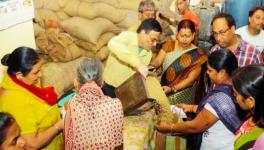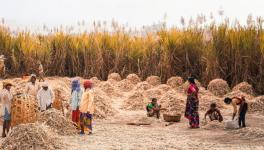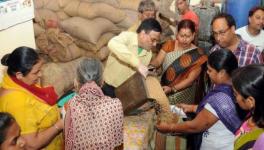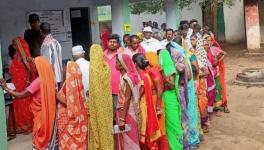UP Elections: Mirzapur’s Bamboo Product Makers Fail to Feature in Poll Agendas
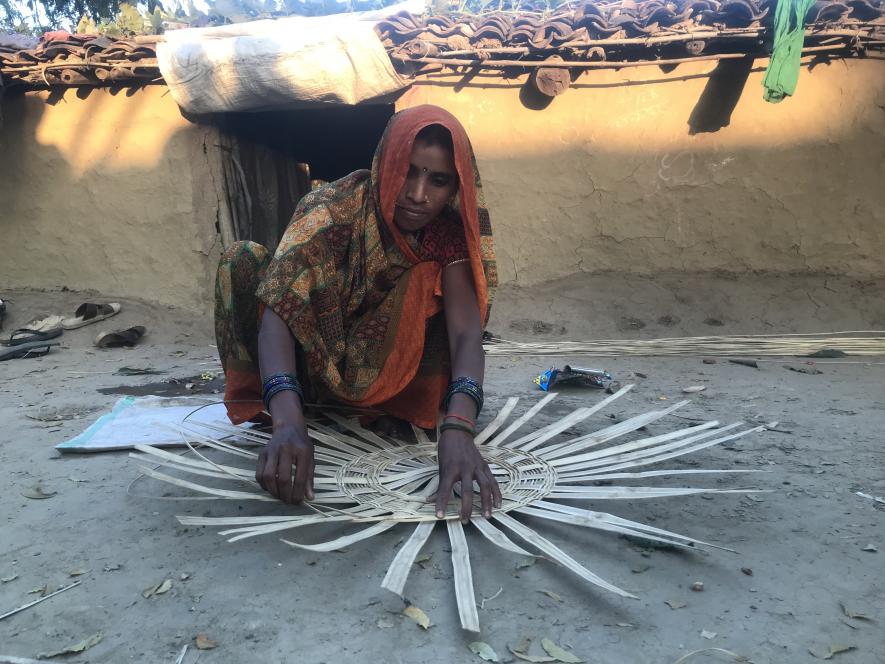
Mirzapur: They are skilled in bamboo handicrafts. Their population is small, and the artwork is their primary source of livelihood. Contrary to the fact that their products are popular in India and globally, they are highly marginalised and are forced to live in abject poverty. Tall claims and lofty promises made by different political parties during election campaigns have no meaning for them as they have long been forgotten.
After days of intensive labour and cutting edge art, what they earn is something that should be told loud and clear — a maximum of Rs 200 and that too, not every day.
They belong to the Benvanshi Dhakar community in the eastern Uttar Pradesh district of Mirzapur. The scheduled caste (SC) group is so outcast that people are not even allowed to work as agricultural labour because the yield will become "impure" if they touch it.
They make numerous products such as tokdi, bhauka, jhauaa (bamboo baskets of different sizes), soopa (used in kitchens to separate husk and stones from food grains) and hand fans. These products are not new to Indian culture as bamboo has been popular here for a long. But the products, of late, are losing market because of the government's apathy.
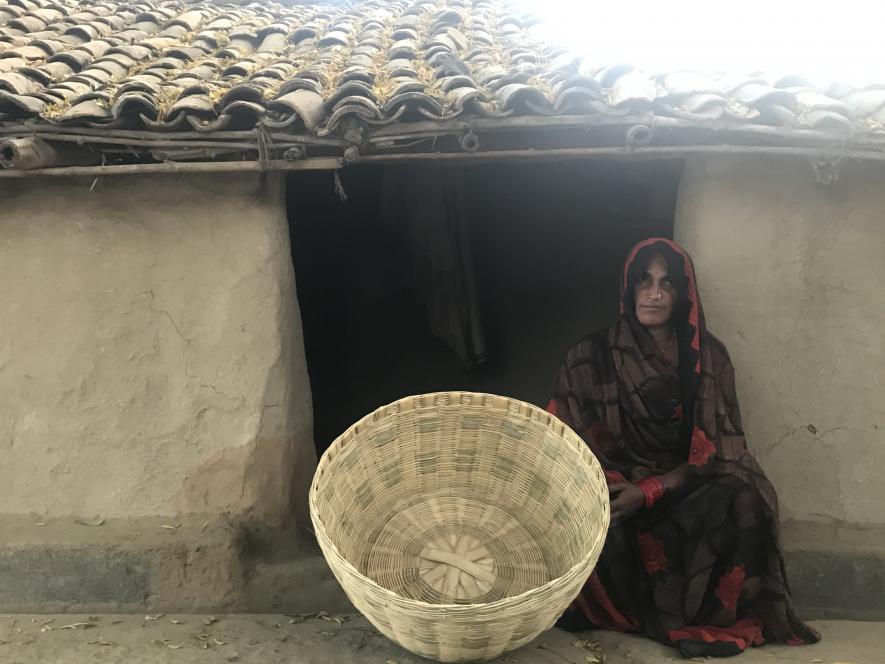
GOVERNMENT APATHY LEADING PROFESSION TO EXTINCTION
Seema, 40, makes baskets and soopa and her husband (45-year Samru) and three minor children. With hard labour for three days, they make a big size basket — which her only 15-year-old son goes to sell in the local market for Rs 200.
"People do not want to tilt their wallet to pay even this small sum, which is nothing in this age of high inflation. Scared of returning with an empty pocket, we sometimes have to sell it at input cost, which is around Rs 150. We have to do it with a bleeding heart as returning without any penny means starvation at home," the resident of Newadhiya village in Patehara block told NewsClick and burst into tears.
Wiping tears rolling down her face, she tried hard to describe the unimaginable sufferings she and fellow villagers of her hamlet face every day but broke down again.
"We (the wife-husband duo) can afford to sleep without food, and we have to do it very often. But as a mother, how can I see my children going to bed without food? No one can. They deserve a bare minimum, the noon-roti, at least twice a day, if not a rich and healthy food," she breaks again and refuses to say anything further.
Sitting on the earthen floor in front of her thatched and dilapidated house, Mahdei was engaged in a conversation with other village women. As this reporter struck a conversation with her, she rose, stepped into her one-room kachcha house and brought out a charpai (cot). She hesitatingly asked if I minded sitting on the cot.
She sat on the floor again despite repeatedly asking her to share the same cot. "We belong to a lower caste; how can I even think to sit beside you even though you are of my son's age. It is the first time when anyone has acknowledged our existence and come here to know about the problems we are faced with," she said.
No government scheme and programme seems to have reached the village, with around 110 houses. They are landless. Despite applying many times, they have not got a pucca place under the Pradhan Mantri Awas Yojna (PMAY), under which Rs 1.3 lakh is given to poor people in rural areas for the construction of a house.
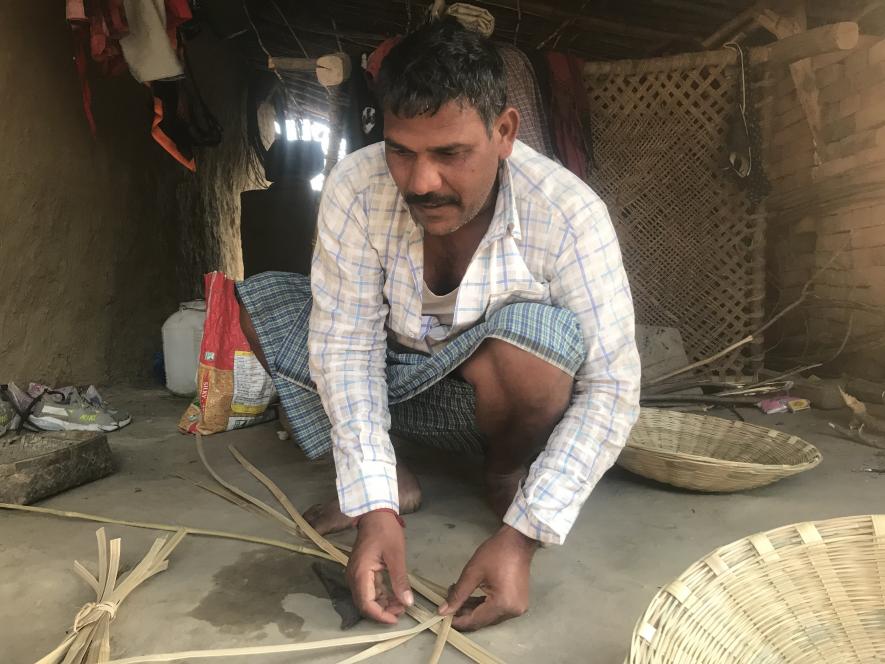
“Except free ration twice a month, we don’t get anything from the government. Whenever our products are not sold, we sell some wheat or rice we get (under the public distribution system or PDS) to earn some money to meet other needs,” she said.
The 55-year-old said she makes baskets and soopa along with her four sons. But they hardly manage to earn even Rs 100 a day. "Most of the time, people take the products in exchange for food grains (barter system). Life is tough," she added, with visible despair on her face.
Babu Nandan, who was sitting on the other side of the road and making a basket, came and intervened. “After repeated requests to pradhan (village head) to push our application for a house failed, we approached concerned officials as well to no avail. They took papers but did not do anything so far. It is probably happening because we are not numerically significant. All political leaders take us for granted. They think that they will secure our votes in return for liquor," he alleged.
The Benvanshi Dhakar community has around 10,000 people in the entire district. They are found in small numbers in ghettos in Mirzapur's Patehra, Sant Nagar, Rampur, Kanhaipur, Rampur, Raikal, Malua and Amoi villages.
The 45-year-old urged with folded hands to pursue their case with the government to get some relief. “What is lacking is a proper platform where we can showcase our skills. With no Government assistance, we are struggling to keep this art alive,” he further added.
Vinod Kumar, 28, said his community had voted for the ruling Bharatiya Janata Party (BJP) in the previous elections — hoping that the party would do something for their welfare.
Asked whom they would choose this time in the ongoing elections, he said his people had not taken any decision so far.
“Since the people in this region vote for the BJP, we also follow do the same. No candidate comes here to seek our votes. We are told even if we don’t vote for the BJP, it will make no difference as the party will win even without our votes,” he alleged.
A resident of Rampur village in Patehra block, Changur, 70, and his three sons are engaged in the same profession. His monthly income, as he said, stands somewhere around Rs 1,000.
“Humke ee kaam karai se jutat haa taa khaat hain, naahi to naahi khaat hain (If our products are sold, then we manage to eat. Otherwise, we stay hungry),” he sold when asked about the condition of his business.
He is the only person in his hamlet who owns a one-room pucca house. “I built the house with Rs 1.2 lakh I had got six years ago from the government under the housing scheme,” he added.
They said festival seasons boost their business, but the influx of plastic products in the market poses a severe challenge to them. "It has drastically brought down the demand of hand made bamboo products," they told NewsClick.
"Our age-old profession is on the verge of extinction because the government fails to protect our interest who earn a living by making bamboo products. We breathe life into bamboo by making various products out of it, using our expertise," said Suraj Prasad, 30.
The making of bamboo products involves several steps. First, bamboo is cut into pieces along it length. Each piece is cut into thin slices along the length. It is now left for days to get dry. The long and thin slices are coloured generally with green and red colours. Finally, the slices are weaved in a particular pattern as per the products.
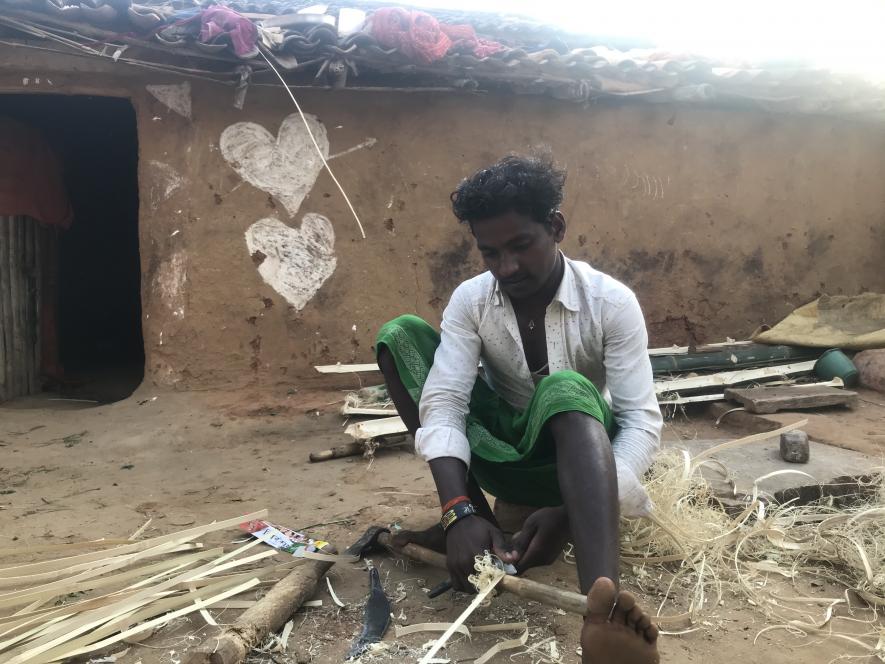
"The process is complex and needs intensive labour, but the return is too little. Therefore, many have turned away from the profession. Many of us have now started working as a construction labourer who, if gets works, at least earn more than us," he added.
The Ujjwala Yojana, which provides cooking gas connections to poor households, does not mean anything for the community women who still use earthen stoves and are always exposed to the danger of contracting respiratory diseases.
The Swachh Bharat programmes have not improved hygiene and safety for the villagers who go for open defecation without toilets.
The community stands at the bottom of all indices, the most backward and neglected even among the SCs. Yogesh Kumar Benbanshi, a journalist by profession who belongs to the same community explained the reasons behind their backwardness.
"We are not numerically significant. Our numbers stand somewhere around 1 lakh across the state. Because of circumstances, we are not perhaps that vocal. Therefore, we fail to grab the eyeballs of the government, political leaders and the media," he told NewsClick.
The resident of Unchdih in Prayagraj is the second generation educated man. He could study journalism and law because his father, an accountant with a private firm in Mumbai, has decent earnings. He is one of his community's three men who reached school and then university for higher studies.
He opined that his community could be brought into the mainstream of the society only if the government constituted a separate commission like the one for SCs and STs, giving a special financial package to the artisans to boost their business and make special arrangements for children to study.
With 136 species and 23 genera spread over 13.96 million hectares, India is the world's second-largest cultivator of bamboo after China. As per the Ministry of Agriculture and Farmer Welfare, the Government of India, the annual bamboo production here is estimated at 3.23 million tonnes.
However, despite such high production, the country's global bamboo trade and commerce share is only 4%.
The state government's One District-One Product program, which encourages such traditional and specialised products and crafts, seems to have no impact on the ground as artisans continue to struggle to make ends meet. However, bamboo products have also been included in the ODOP list and put in 'Hunar Haat' for exhibition.
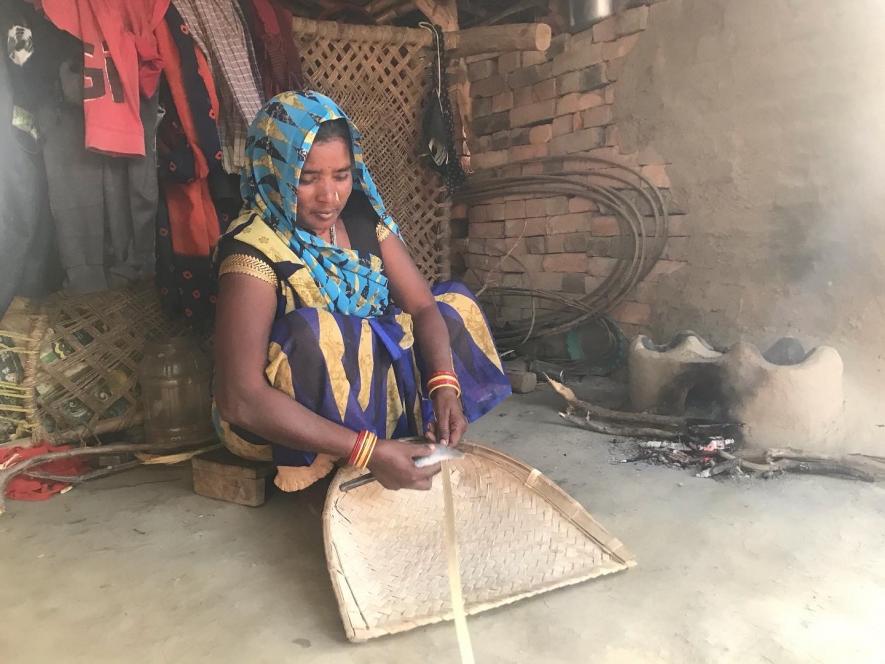
It would have been heartening for these people had the party and others in the fray felt that the issues of this population were important enough to feature as an essential aspect of their election blueprints.
Mirzapur will poll on March 7 in the final phase of the seven-phased UP Assembly elections.
Get the latest reports & analysis with people's perspective on Protests, movements & deep analytical videos, discussions of the current affairs in your Telegram app. Subscribe to NewsClick's Telegram channel & get Real-Time updates on stories, as they get published on our website.









